![]()
Singapore Airlines warned of “protests by university students developing in Dhaka” as we boarded the plane. But emails from Delower and Rahnuma during the brief stopover in Singapore talked of the curfew in place in the six main cities. This was no longer a small skirmish in Dhaka University. Joshim was going to be at the airport with my accreditation card and we would try and find a way back home.

Students at Dhaka University under teargas attack, throwing bricks at police. 22 August 2007. Dhaka Bangladesh ? Munir uz Zaman/DrikNews
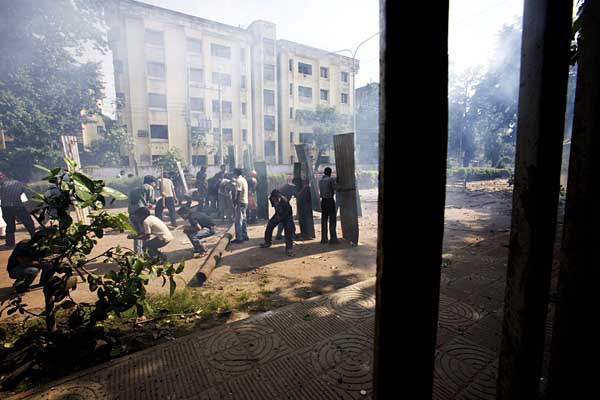
Students at Dhaka University shielding themselves with sheets of tin, during fights with police. Photographer anonymous.
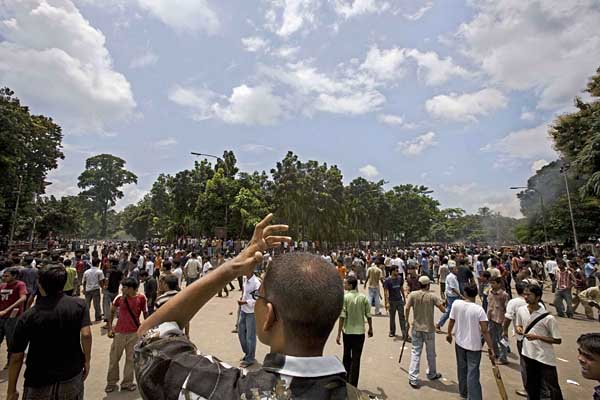
Protesting students gather at Dhaka University campus during violent clashes with police. Photographer anonymous.
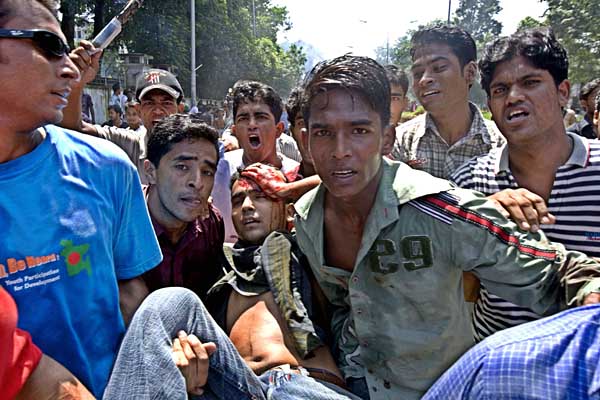
Student hit by police shotgun bullet being carried away by fellow students. Photographer anonymous.
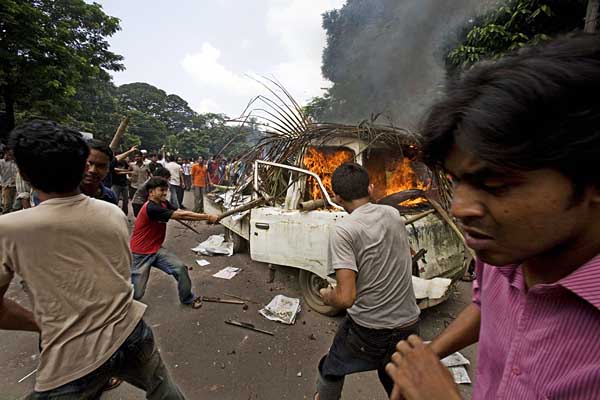
Enraged students burn a car at the Teacher’s Student’s Centre (TSC). Photographer anonymous.
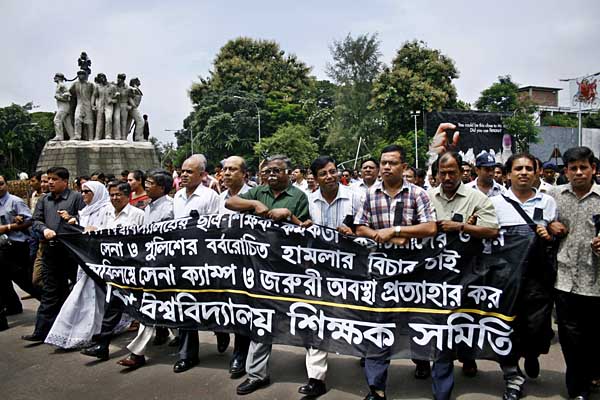
Members of Dhaka University Teacher’s Association protesting against the attacks on campus by police and army, and demanding withdrawal of the state of emergency. Two of the teachers in the front row have since been arrested. 22 August 2007. Dhaka Bangladesh ? Munir uz Zaman/DrikNews
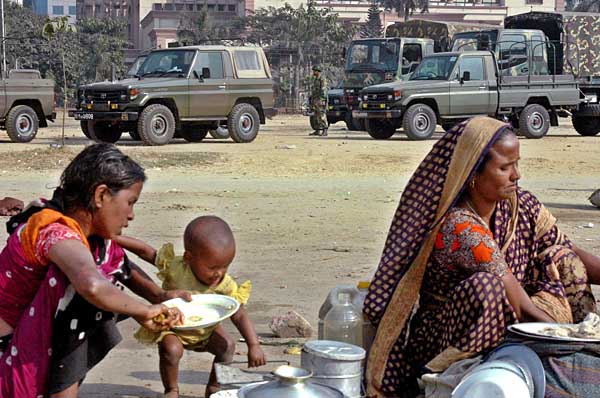
Rocketing prices of essentials create extreme distress for people with low earnings, like the people pictured in the foreground. The military of Bangladesh, which has not had to fight since the birth of the nation in 1971, has in the meanwhile, had increasing budgetary allocations in each successive regime. Numerous allegations about corruption in military purchase, has gone uninvestigated. 22 August 2007. Dhaka Bangladesh ? Munir uz Zaman/DrikNews
The government had taken all mobile networks off the air. With only official press releases for information, the person in the street was in for a rough time. It was easy to find Joshim in the empty car park. Only the occasional long distance truck plied VIP road. I put the video camera on record mode, but relied on my less conspicuous LUMIX to photograph the empty streets. Though I stopped on the Mohakhali flyover to take pictures, I was nervous when the RAB vehicles passed below. There was never a good time for being arrested, but this was as wrong a time as it could get.
Aaasteeey! The policeman strode over lazily. Ki bapar? I did have my card dangling from my neck, and from previous experience, used my confident, ‘I belong here’ approach. That usually worked best with low tier security people.
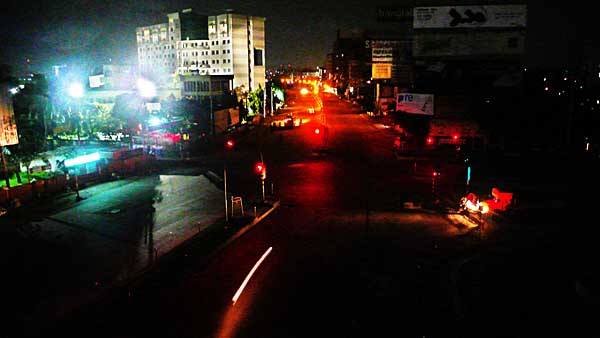
The Mohakhali Junction, one of Dhaka’s busiest traffic spots, is empty on the night of the 22nd August, when the government called an indefinite curfew. Dhaka Bangladesh. ? Shahidul Alam/Drik/MajorityWorld
I’d stopped to take pictures by the near-empty Tejgaon rail station. Stepping carefully through the people sleeping on the floor, I came up to Shahjahan and Neela. Unaware of the curfew, they had brought their sick child Shamim from Tangail, but got stranded in Tejgaon. There was no food, no doctor, no place to sleep, no way of knowing how long this would go on. Each visit to the toilet cost 5 Taka.
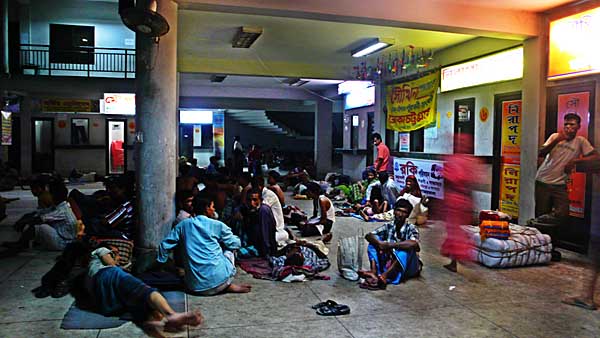
Stranded passengers at Tejgaon Railway Station, sleep on the floor. 22 August 2007. Dhaka Bangladesh. ? Shahidul Alam/Drik/MajorityWorld
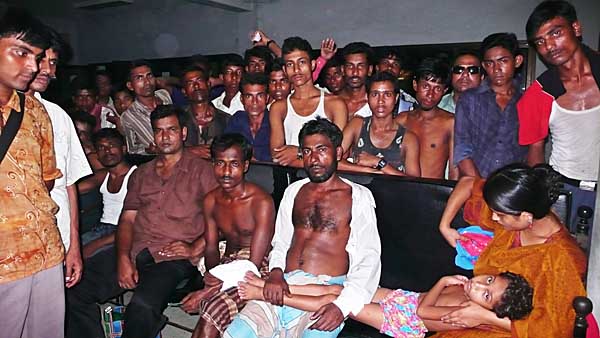
Shahjahan and Neela tend to their sick child Shamim, whom they had brought to Dhaka for treatment. Along with other stranded passengers at Tejgaon Railway Station, the family had no food or drink, or a place to sleep. 22 August 2007. Dhaka Bangladesh. ? Shahidul Alam/Drik/MajorityWorld
The next checkpost was slightly more hostile, but the expired accreditation card dangling from my neck was working overtime. We passed without much harassment. Dropping Joshim home, I went past the Shonar Bangla Market in Karwan Bazaar. The busy market place had a haunted look. No cackle of chickens, haggling for prices, or calls from vendors. Just one man counting loose change.
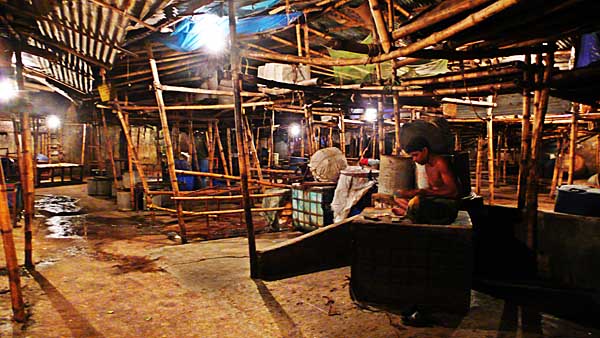
Shonar Bangla Market at Karwan Bazaar is one of the busiest market places in Dhaka. The shops are empty on the night of 22nd August 2007. Dhaka Bangladesh. ? Shahidul Alam/Drik/MajorityWorld
The brightly lit Square Hospital in Panthapath stood out in the dark. Government orders to turn down the lights after dusk to save electricity was presumably for commoners only. The street was empty, but this time as I approached with my camera police converged from all directions. I fumbled a bit, but recovered in time to get one shot. This was not the time to look for best angles. Rattling off important sounding words like ministry of information, and dropping the occasional names I could think of, I got into the car and drove off before the uniformed men had gathered their wits. A government adviser’s business interests in Square Pharmaceuticals – while undeclared – was well known. Students had already attacked the building the previous day. The approaching police knew whose business interests to protect.
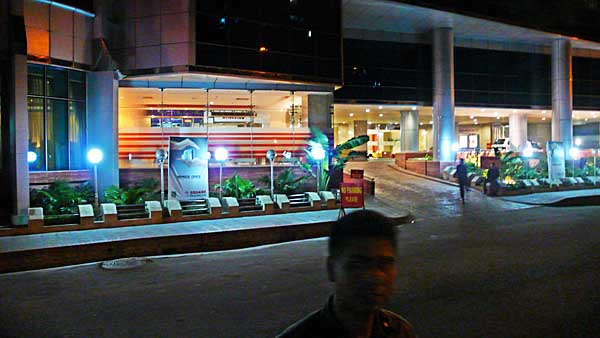
The Square Group, one of the wealthiest business enterprises in Bangladesh owns the Square Hospital. Government regulations prohibit the excess use of electricity and non-essential shops are required to close by 8 pm. Several people were killed by the police when they came out in protest, demanding adequate electricity. The Square Group is owned by the family of one of the advisers of the caretaker government. 22 August 2007. Dhaka Bangladesh. ? Shahidul Alam/Drik/MajorityWorld
The road through Dhanmondi was eerie. The women who walked the streets near Abahani playground were nowhere to be seen. Like the many others who struggled to make a living, they too would not be earning tonight.
The junction near ULAB was scarred by burnt tyres. The convoy of police vans deterred me from getting my camera out and I turned into road 4A. It was time to go home. Kamaler Ma, Joigun, Zohra and Rahnuma were all up waiting. With the mobile network off, they didn’t have any news about me. There must have been others in many more homes who were up worrying.
Rahnuma and I talked of the events over the last two days, of the army camp in Dhaka University. Of a soldier slapping a student. Of the vice chancellor (acting) being beaten up by police. This had never happened before, not even during the Ayub or Ershad military regimes. The reference to ‘evil doers’ in the chief adviser’s speech to the nation was worryingly close to the ‘axis of evil’. Independent media channels were then still defiant. That night the information adviser advised the media to practice ‘self censorship’.
Despite their claims, this government had never been called in by the people. We had no say in who the advisers would be. It was not military rule the people had welcomed, but the cessation of violence and the fear of further anarchy if the rigged elections were held. Banana trees would have made equally good replacements. However, banana trees would not have sold national interests. Closed down environmentally-friendly jute mills. Made slum dwellers homeless, or tortured and killed adibashis protesting the military acquisition of their ancestral lands. So while there was initial relief, as the price of essentials soared, news of nepotism and the partisan manner in which Jamaat -e-Islami was being shielded soon made people realise this banana tree would never bear fruit, let alone run a government.
Warrantless arrests by plainsclothes army under the cover of curfew. Dissenting teachers picked up in the middle of the night. Making threats to independent channels ETV and CSB are hardly the character of a saviour government pledged to the return of democracy. As the behind-the-scene military decides it will now take centre stage. As Bangladeshis realise that a democratically elected autocratic government has simply been replaced by an unelected autocratic one, the tune in the streets is changing.
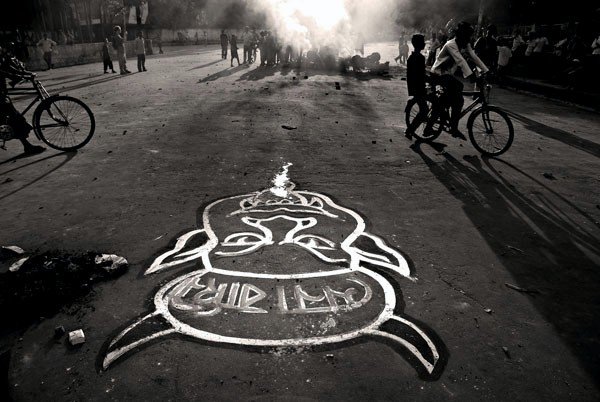
Symbols of fascist oppression drawn on university road. 21st August 2007. Dhaka Bangladesh ? Munem Wasif/DrikNews
Multiple demands of students and teachers have been whittled down to one – withdraw emergency rule. Underground pamphlets are spreading like wildfire. With the Internet down, text messages are filling up the ether. The information adviser’s suave statements to the media faltered as he snapped, “why such a fuss about a slap or two?”
****
The photograph that was being shown here has been removed on the request of the photographer
****
“In unprecedented scenes, soldiers in uniform were seen being chased out of the Dhaka university campus by students. In two days, the myth of the army’s omnipotence was all but laid to rest.” BBC. Photographer Anonymous.
The US has declared support for the chief adviser’s statement. What he lacks is the support of the people.
26 thoughts on “The Barren Banana Tree”
Leave a Reply
You must be logged in to post a comment.

I cannot but agree to every single line of your post! Perhaps in a different time and situation I wouldn’t have felt the urge to comment, but these strange times that have found us and continue to haunt our nation has created an urgent need for solidarity. I need to comment on your post to achieve if nothing but my selfish need for solidarity!
Looking at yesterday’s news at the BBC website, I wanted to comment but then decided not to. I am sure there are many like me who feel the same way but cannot express this feeling of fear and oppression. But what is to fear or feel oppressed about? Am I not the proud upper-middle class for whom this condition does not alter anything? I am not affected by the flood. Increased rise of price commodities do not seriously alter my monthly budget or lifestyle. Curfews and hartals only add another good day to rest at home. Those who read this post and comment will have the sufficient privilege of a computer, an Internet connection and education. A stark contrast to those who have not. And in our nation there are many who have not.
In Gulshan by the towers that rise above, near the shopping malls and extravagent over-priced eating outlets lies a slum embanked on two sides of Gulshan lake.
Our current situation is increasing the rift. These people will not have the right to say anything. They just vanish from the face of earth one by one, day by day. Who cares for them? This reform and the trash we hear – who includes them, who thinks about them?
The barren banana tree. Of all the fears, this tree may have a darker side which is very dark. A darker side that will allow the tree to flourish for the next 20 years. It will rob our speech, our tongue, our human rights, our freedom.
The new face of power backed up by big guns, supported by empirical civilizations, and the might to crush and silence anyone and everyone, is here to stay.
What will we do? What can we do? Do we escape? Can we even escape?
Since my arrival in Bangladesh from India nine months back it was the CTG that ruled the roost. I had come here with forebodings of being in a country of never-ending political turmoil, but lived in apparent peace during my stay. Apparent, yes. The angst that has been festering, the silent voice of protest that has been brewing, all of a sudden blew up the lid. The event has indeed touched a raw nerve of the people. The actions of the powers-that-be are unpardonable and shameful to say the least. Its uregent than ever to sit up, speak out and take stock. When the future of the country is at stake, there are many questions we all are asking. Its time enough to seek out the answers.
the tree is not just barren but also extremely poisonous…and it will make every effort to poison our eyes, our minds…causing terrible havoc and pain…
but its might is its biggest weakness, too (because of its very nature and source)…because after a while its poison will turn towards itself?that is what history taught us?sadly, the lust for power is so blinding that those who are in possession of it can hardly see it?
there is no escape?but only a dim hope?that one day things will really change?the photograph of a student chasing away the man in uniform does more than rekindle this hope…it reminds us that we are not weak and powerless against this oppressors…rather, in our solidarity we are far more stronger than they can ever imagine…
not agree wit all the post n pictures.it was a critisism of army.the pictures showed a wounded students.wounded one may be some student but ppl around him are looks like piketers,nt student.this type of news,thiese news is totally negative,nothing here showed positive.for bangladeshi’s unity and bangladesh’s prosperity everybody have duty.personally me,in 1998 when affected by massive flood in minshigonj(Whr is my grandfathers home),i saw wht army did for ppl,wht they did to save th DND dam in narayon gonj,tried to save Dhaka 4rm flood.that army soldiers put out their combat boots,worked with normal ppl ,take sack of bricks in their head to save the dam.army doctors given highest medical support to flood affected ppl.we have to think,this army is not any outsider,it is our army.they all are from differnt families of bangladesh.they are not super human,they r human like us nd no human is perfect.a soldiers(who entered in army after SSC!!) created the problem.even he has nt the knowledge abt the problem.but we totally blaming the whole army,is this the way of journalism,is this the way of dividing the nation??now the students are used.these are the tricks of dirty politics started from second day.we gave 15 year to political govt,but wht we got??we should give this govt some time.And BBC is a cause of conflict in many days.remeber Iraq and afganistan war.what they did??this is our country,our motherland,no foreign country has right to involve and comment about our internal situation.our problem we will handle it.is nt it?
Thought provoking writings and pictures though.. But ..
Switching from democratically elected auto-crates to non-elected military backed auto-crates that raises question should we wait until 2008 or we let some one else to give blood for our old way of life .. It is for sure who lived for power and bribery will never give their life .. on what rights these people encourages and ask other to give their blood ..
I will never be affected with the current situation in Dhaka nor my families or friends are on the verge of total extinction so what right I have to comment and what right any one has, to ask other to give life/blood for their way of life .. Should not we wait for 2008/2009 and think back about our past mistakes so that we do not repeat them .. I can see Ghost of Mujib every where who with their meticulous speech ask every one to sacrifice themselves and alas the leaders always stay put in their home to bear the fruit at the end ..
But I do admit the picture of Square Hospital another example of meticulous yellow journalism .. Yes it has a few or more extra lights outside .. But why a hospital should shut down itself to save power ? And also should not it have its own generators ..
We are in a situation that will hurt us in either way .. and We should remember what goes around comes around .. Now our past injustices are hunting us back with full vengeance ..
At the end, My soliderity goes to CTG and shame for those who constantly begs to withdraw support from CTG by the US/EU are shamelessly criticising the US/EU and our own motherland and our own army who have started the first fight for our freedom in 1971.
only one thing to say to the govt..
ffffffffffffffffffffffffffffffffffffffffffffffffffffffffffffffffffffffffffffffffffffffffffffffffffffffffffffffffffffffffffffffffffffffffffffffffffffffffffffffffffffffffffffffffffffffffffffffffffffffffffffffffffffffffffffffffffffffffffff
as i understood the posts, it reflected the current affairs, it reflected people’s suffering. however it also reflected people’s attitude and sentiment toward army as the ruler. right at this moment we are not standing at a point to compare political regime and army rule. though one should not forget that today we have got ‘our’ army, as our politicians fought for our independence and sovreignity yesterday. a worst democracy is way better than best autocracy. and it seems that our present rulers are obligated to the imperial power, not to it’s own people. for me a call for solidarity means a call to wake up against all the imperial agents in home and abroad.
Dear Shahidul,
Greetings from Quito, Ecuador.
Great pictures, sad situation.
Hope you are fine.
best wishes
Luis
The Bangladesh Army now has nothing to do with the Bangladesh Army of 1971. The present army has ruled the country directly for over fifteen years, and indirectly in the camouflage of political outfits for more, has first disrupted the political process in 1975, and has since then embarked on various forms of organized corruption and uniformed thuggery. A civilized society cannot rely on the army for its functioning.
What happend in Du is simply shocking?Army got the no right to do that.But at the same time it was a fantasy for the student as well.
In his second round of interview with Tasneem Khalil, M Sanjeeb Hossain, son of detained DU Professor Anwar Hossain, detailed what his father told him about the DGFI ?black hole,? his torture and what happened in the court. Considering its significance, this pod was recorded both in English and Bangla.
More :http://www.e-bangladesh.org/2007/08/26/pod-anwar-hossain-tortured-in-dgfi-%e2%80%9cblack-hole%e2%80%9d/
The latest incidence has shown us the lack of discipline among the educators and the students.
Painfully our teachers at some cases played more worse role and are more reckless than our students.
They should behave and they should be taught how to be disciplined, but who will do that ! Recent teacher and student operation in all university start violance JALAO/PORAH destabilise the country.Is this way to protest ?? Are the students fighting for democracy? During the BNP and AW terms,what type of democracy did we have? Corruptions and corruptions, and raping our nations of wealth that benefited only 1 to 5% of our society.
Students and teachers, why you did not protest during that time?
Please explain and I would really like to hear your answer.
Army was our last hope to stabilize our nation. The picture of mob betting of an Army office was disgusting and I hope the Army looks for
this kind of trouble makes and give them the *boot*.
Look at those poor people eyes in Bangladesh. Do they want power? Do they care who is in power? They want food to eat a job to work and a place to sleep? They don’t want JALAO/PORAH ! They want a peaceful normal life.
We know our 36 years of habits it won’t go so easily it just like dogs tail, even if you keep them to be straigthen for 12 years it will come out curve
We all were students at some point of our lives – and we all know how easy it is to excite the youth in the name of movement.Our press, literature accolades the heroism on the part of the students – students also feels that are doing something good, serving themselves, serving the nation by participating in the movements.
I was a student about 28 years back and my parents
worked and saved money for my education. I think the students shouldthink about their parents and the hard earned money they have saved for their son or daughter education.
We should seperate politics and
vandalization now and in future.In te interest of democracy all nationalpolitical and student parties should give up vandalism, hartal, oboroth.
No civilize nation like to see military dictate civil government.CT government’s primary duty is to conduct fair election. So people of Bangladesh will able to choice their people to run the country. If you delay the process that could be dangerous for the country. Nobody wants to see such situation more vandalism, hartal, oboroth.
Thanks.
My protest is against the abuse of power. I have done so during Ershad, Khaleda and Hasina and do it now. The army is meant to serve the people and not the other way round, so why is it ‘disgusting’ when a soldier gets the boot, but not so when a student does?
Of course the people want peace. Firstly they want food they can afford to buy.
Thanks for the post/pics. Hope you and fellow driksters are safe.
Alam Bhai, wonderful article as always. I know you are a passionate man. The CTG appears to have its own unwritten law to prosecute all who speak up against its mistakes. Freedom is worth fighting for and I applaud your bravery. A lesser man, like myself would not dare speak out against the autocracy for fear of the witchhunt.
well done, friend
The pictures were quite disturbing. However, there were the other side of the pictures too !
Looks like, you have forgotten the First week of january 2007.
Army had nothing to do with it.
The BD Army Was more than 4 ocassions to take over, yet the Army Chief declined.
Army boys live their own way in the barracks.
Its no fun, in patroling in the roads and staying in the camps for months together, leaving their near and dear ones.
Some of the readers may be knowing that, in aid to civil poer duties hardly pay them off enough.
Don’t just blame and spoil a pride institution.
Its the last lite of our hope !
Intellecuacy cud’nt so far saved the nation.
Thank You so much.
Just want to share an experience. It was the time when democracy was in full swing..flourishing with enormous pace.
At one end the army of BNP, and the opposite end was ruled by mob of AL. My mother became seriously ill on a HARTAL day and doctor recommended to transfer her to Dhaka immediately. Love for a mother didn’t stop us to take the risk and start a dangerous journey from our hometown to the capital. It didn’t last 10 min, a mob of 20 people in festive mood threw us from our seats, set our 20 years old car on fire and celebrated the occasion as victory against aliens.
Now, why shall I cry for democracy? what it gave me? Deep down in my heart I feel satisfied, at least someone acted on my behalf. Those Grand Dons of Democracy are behind the bar, and next time I go to my country, I’ll have a talk with my mother in a graveyard and convey the message of justice, justice for our family. I don’t care about the country, I don’t give a shit for democracy….
I don’t believe we’ve ever had democracy in full swing. We have had elected governments. The fact that we haven’t had democracy cannot be an argument for not striving for it. I am sorry about your mother. What the mob did is precisely what democracy is against. Whether it be perpetrated by civilians or the military.
The Barren Banana Tree reflects the truth about the society, which lost its way. Society as a whole wants to ride the violence off the society through violence. Can we ever achieve anything without violence? When we will learn to protest peacefully? When will we learn to be civilized enough to settle our differences through dialogues, debates, and arguments? I blame our education system for that. Our education system is not teaching civic responsibilities and duties to these youths. Every time there is a protest march, there is destruction of properties? Do they ever think that destroying government properties is nothing but destroying national wealth? Who are they punishing by destroying government or personal properties? I think, these are all misguided youths. They are not getting proper education that will make them responsible and civil human being. This JALAO/PORAO incitement comes from leaders, who are irresponsible themselves and lacking in morality and civic senses. They are leaders either by dint of their mussel power or their money, devoid of civic responsibilities. We need good law and order institutions so that no criminal offenses go unpunished. Unfortunately, we have corrupt law and order institutions which are not independent, and are totally biased against religious minorities. As a result, perpetrators committing atrocities on minorities mostly go unpunished. I saw a very recent report by a brave Daily Star reporter, who was abducted from his home by the DGFI personnel due to his recent reports on the shadow Government and the Army. As they were beating him during his interrogation session in the DGFI office, they were shouting to this brave Muslim reporter that he looks like an ?ugly Malaun.? To them, all Malauns are ugly (animals). Can any one assure me that a real Malaun will not be treated harshly just because he or she happens to be a Malaun? Can you imagine what a real Malaun will go through in the DGFI office? Can they get justice anywhere in Bangladesh?
What has the world come to today. It needs to stop